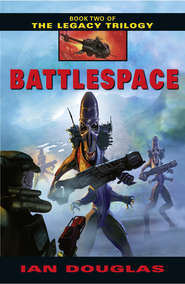По всем вопросам обращайтесь на: info@litportal.ru
(©) 2003-2025.
✖
Abyss Deep
Настройки чтения
Размер шрифта
Высота строк
Поля
“There’s life here now?” Dubois asked. He looked around the encircling landscape, wind-blasted waves and spray in one direction, and in the other an endless plain of undulating white ice beneath black and lightning-shot clouds.
“Of course,” Murdock told him. “The cuttlewhales.”
Murdock turned, sweeping the ocean panorama with his arm. In the distance, halfway to the horizon, something sinuous emerged from the sea.
The thing wasn’t close enough to get a decent look at it. It was large, obviously, perhaps fifty meters or more in length, and a good half of that was arcing high above the wind-whipped surface of the ocean. It was also obviously alive, twisting and arcing and writhing as it plowed ahead through the water, tantalizing in its mist-shrouded obscurity. It put me in mind of a mythical Earthly sea serpent, and I wanted to see it up close.
“Can we get out there?” I asked. “Or bring that thing in close? I can’t see through the spray.”
“Sorry, no,” Murdock told me. “This is the best data we had prior to sending the last courier to Earth.”
I had to remind myself that the information I was seeing was five years out of date. Had the colony managed to make contact since then?
Had something gone wrong with that meeting … something that had ended with the colony’s destruction?
That was what we were going to try to find out.
“Some of our people saw one close up,” Murdock continued, “but they didn’t get any images. They said the head is something like the head of a terrestrial squid or cuttlefish … and that it could change the coloration on its body in pretty complex patterns. Dr. Samuelson believes they may use their chromataphores to communicate fairly complex ideas … which is why he reported that they may be intelligent.”
A number of species on Earth could change the color and patterning and even the apparent texture of their skin by controlling their chromataphores, which are pigment-containing organelles in their skin. That didn’t make them intelligent, however. They used it for camouflage or to display emotion rather than for more complex communication. Sure, an octopus flashes dark red when it’s angry and white if it’s afraid, which is pretty complex when you think about it, but that doesn’t make them starship builders, either.
I found it interesting that one of the toughest jobs in xenobiology is determining whether a given species is intelligent in the first place. The jury was still out on these Abyss cuttlewhales. Hell, we still aren’t sure what intelligence is, though we know there are many different kinds, and that it includes things like problem-solving skills, curiosity, and self-awareness. Wegener, the guy who made first contact with the Brocs, is supposed to have said, “I don’t know what intelligence is, but I know it when I see it.”
The trouble is that often we don’t know it when we see it … or we find we’ve been looking for all the wrong things. The Europan Medusea are a case in point. Are they intelligent? Beats me. And we may well never know, simply because we don’t have enough in common with them to even begin to communicate with them on a meaningful level.
“Come on,” Murdock said. “I’ll show you the base.”
Two hours later, we’d been through the dome top to bottom, and met a number of the researchers there. They seemed like nice people, most of them, and that left me with a nagging depression. It was entirely possible, even likely, that every one of them was already dead, that I was speaking, in a way, to their digitized ghosts.
But the ordeal ended at last, and I emerged back in the lounge area on board the Clymer.
“That’s it, E-Car,” Doobie said. “I’m outta here!”
“Have fun,” I told him.
And I resolved to have chow in the mess hall, then retire to my quarters for a quiet evening alone.
Supper was a mystery-meat culture that was actually pretty tasty if you dialed up the habanero sauce. It was well past the main mess period, and the place was nearly empty. I finished up, then went back to my quarters.
“Elliot?” It was Joy. My secretary had orders to always route her calls through. I was surprised to find she was standing right outside my compartment. “Can I come in?”
I thoughtclicked the hatch open and she stepped inside. She palmed the touchpoint on her shipboard utilities just below the throat and they evaporated as she came into my arms, gloriously nude. “I had to see you,” she said. “I … I volunteered for the Haldane expedition, but they wouldn’t take me!”
“I know. I looked up the personnel manifest.” They were only taking twenty-four Marines, after all, out of a company numbering almost two hundred people. Someone had to stay behind.
“I was trying to swap assignments with Gibbs, but he wouldn’t agree to it.” She looked disgusted. “The idiot wants to go.”
“Well, apparently, so do you.”
“Because I want to be with you.”
I reached up for my own touchpoint and clicked my uniform away. By that time, I didn’t even need to go to my in-head menu and turn on my CC-PDE5 inhibitors. I was ready… .
But of course Sergeant Tomacek chose that moment to come through the door.
Bruce Tomacek was one of the three Second Platoon Marines with whom I shared a berthing compartment, a nice enough guy, but with a nasty tendency to tease newbies unmercifully.
“What the fuck?” he asked when he saw our embrace. “Hey, E-Car, if you’re on restriction you’re not supposed to enjoy it!”
“Do you mind?” I asked. “We’re saying good-bye.”
“Nope,” he said, grinning as he dropped into the chair at the compartment’s small desk. “I don’t mind at all!”
Privacy was always tough to come by on board a Navy vessel, but we did have an answer. The compartment’s rack-tube hatches occupied the bulkhead to the left of the door, four circular openings that cold be sealed shut with a thoughtclick. At just a meter wide, they were a bit on the claustrophobic side for two, but it could be done. I helped Joy into mine, gave the leering Tomacek a dirty look, then skinnied in next to her. I thoughtclicked the hatch shut, and we were alone.
Each rack-tube had internal lighting, Net connection pads, environment controls, and a flow of fresh air from hidden vents. The padding was warm and soft, as was Joy. I took her in my arms and we snuggled close.
“Just like the hoteru,” she said, smiling into my face.
“Well, except for the gravity, yeah.”
Rabu Hoteru was the Japanese honeymoon hotel in Geosynch. Joy and I had spent a couple of nights there on liberty once, just after we’d come back from Bloodworld. Zero-gravity sex is a lot of fun, but it helps if you and your partner are … restrained, somewhat. In microgravity, every movement has an equal and opposite reaction, and what is euphemistically called “the docking maneuver”—and staying docked—can be a bit tricky.
The answer was softly padded tubes in the honeymoon suites, where you and your partner could get plenty of purchase for your more energetic acrobatics. The ends were left open, so you could look toward the head end of your tube and see the endlessly wondrous spectacle of Earth hanging in star-clotted space.
Вы ознакомились с фрагментом книги.
Приобретайте полный текст книги у нашего партнера:
Приобретайте полный текст книги у нашего партнера:











